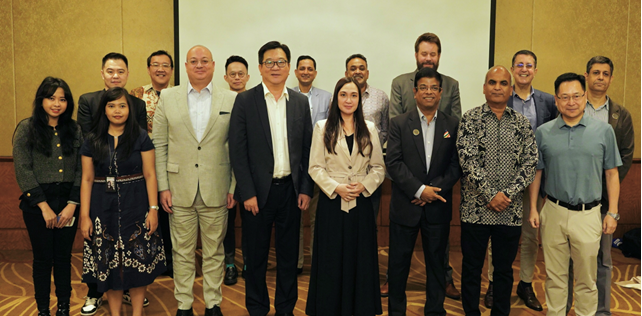
19th May 2025, Mulia Hotel, Jakarta

19th May 2025, Mulia Hotel, Jakarta

"The ASEAN Economic Resilience Index (AERI)" is a comprehensive measure designed to assess and rank the economic resilience of member countries within the ASEAN. This index incorporates a range of indicators, including but not limited to economic diversification, fiscal strength, trade balance, financial stability, and social resilience. By quantifying and comparing these factors, the index aims to provide insights into the ability of ASEAN nations to withstand economic shocks, adapt to changing global conditions, and promote sustained growth.

A visionary initiative that combines a dynamic Skill Platform and an innovative Job Platform to catalyze the professional growth of young talents and emerging leaders within ASEAN region. This unique ecosystem is designed to foster economic development, promote regional cooperation, and address the critical skill gaps in today's global marketplace.
The digital economy has emerged as a transformative force in global trade, reshaping traditional business models and creating innovative growth avenues. In the ASEAN region, embracing digital economy is pivotal to advancing economic integration, enhancing competitiveness, and fostering sustainable development.
However, realizing the full promise of this digital transformation requires embracing cutting-edge technologies and agile methodologies, particularly in the context of regional digital integration. On one side, the ASEAN Digital Economy Framework Agreement (DEFA) provides a strategic framework for ASEAN to harness the power of digital technologies to drive economic growth and development. On the other hand, businesses need to leverage this avenue by implementing robust and scalable digital solutions, such as cloud-native technologies, with their ability to enable rapid innovation, scalability, and resilience. This synergy is crucial for implementing DEFA's objectives and fostering a seamless digital ecosystem across the region.
This Policy Roundtable, "Cloud Native: Fuelling ASEAN's Digital Revolution," will explore the critical role of cloud-native technologies in driving this transformation, examining how they can empower businesses, governments, and individuals to thrive in the digital age. Its goal is to explore the potential of cloud-native architectures, their synergy with agile practices, and their implications for the ASEAN digital economy, particularly in light of regional frameworks like the DEFA.
The digital economy is rapidly reshaping the global landscape, and ASEAN is no exception. The region's burgeoning digital landscape presents significant opportunities for economic growth, job creation, and improved quality of life. The Boston Consulting Group projects that through natural digital adoption, ASEAN’s digital economy could grow from US$300 billion to nearly US$1 trillion by 2030. However, navigating this complex and rapidly evolving environment requires a shift in how we build and run software applications. This is where cloud-native technologies come into play.
Cloud-native technologies may be a catalyst in fueling ASEAN's digital economy as they enable the agility, scalability, and resilience necessary for rapid growth and innovation. By fostering a microservices architecture, cloud-native allows businesses to develop and deploy applications quickly and efficiently, adapting to rapidly changing market demands. Containers and orchestration platforms like Kubernetes ensure consistent performance and scalability, enabling businesses to seamlessly expand their reach across ASEAN's diverse markets.
Furthermore, the inherent resilience of cloud-native architectures minimizes downtime and ensures business continuity, crucial for maintaining trust and reliability in digital infrastructures. This combination of speed, scalability, and resilience, when synergized with agile methodologies, empowers businesses to capitalize on DEFA's provisions for cross-border digital trade, facilitating market access and regional integration. Agile methodologies, with their focus on iterative development, continuous feedback, and close collaboration, accelerate the development cycle, enabling businesses to rapidly adapt to changing market dynamics and deliver innovative solutions.
Currently, Southeast Asia is experiencing significant growth in cloud adoption, with businesses across various sectors embracing cloud-native technologies to modernize their operations and gain a competitive edge. The cloud computing market in Southeast Asia reached approximately $2.18 billion in 2022, marking a 25% increase from the previous year.
However, challenges remain, including a shortage of skilled cloud-native professionals, concerns about data security and privacy, and the need for robust regulatory frameworks. The forthcoming ASEAN Policy Roundtable on Cloud Native Technologies presents a critical opportunity to address these challenges. It will review existing policy frameworks, identify regional challenges, and explore diverse perspectives across ASEAN on the implementation of cloud native technologies. By facilitating collaborative dialogue and focusing on technological, financial, and regulatory solutions, the roundtable aims to foster a discussion on a digital transformation that benefits all ASEAN member states.

Group Photo of AEF Policy Round Table
The event began with opening remarks from Mr. Ashish Kapahi, CEO of the ASEAN Economic Forum. He addressed the global economic outlook, highlighting challenges such as climate change, geopolitical conflicts, and an increasingly unilateral global order. Kapahi emphasized the importance of ASEAN Member States (AMS) preparing for potential economic slowdowns.
He also referenced the ongoing development of the Digital Economy Framework Agreement (DEFA), which is expected to boost both intra- and inter-regional trade once implemented. The roundtable was also attended by observers, including:
During the discussion, Mr. Cyrus Daruwala emphasized that a cloud-native approach is essential for fostering collaboration among AMS—ranging from smaller nations like Brunei Darussalam and Singapore to larger economies like Indonesia and Thailand. Cloud technology, he argued, is a critical enabler for enhancing ASEAN’s trade with global partners, particularly China and India. However, challenges persist, including disparities in economic development, technological maturity, political landscapes, data ownership, privacy concerns, and digital security.
The roundtable concluded with five key policy recommendations for ASEAN Member States, the ASEAN Secretariat, and regional business stakeholders:
This roundtable highlighted the strategic role of cloud computing in ASEAN’s digital transformation and the importance of coordinated policy and innovation efforts to ensure inclusive, secure, and sustainable growth across the region.
To download a detailed Policy Brief, please click the link here